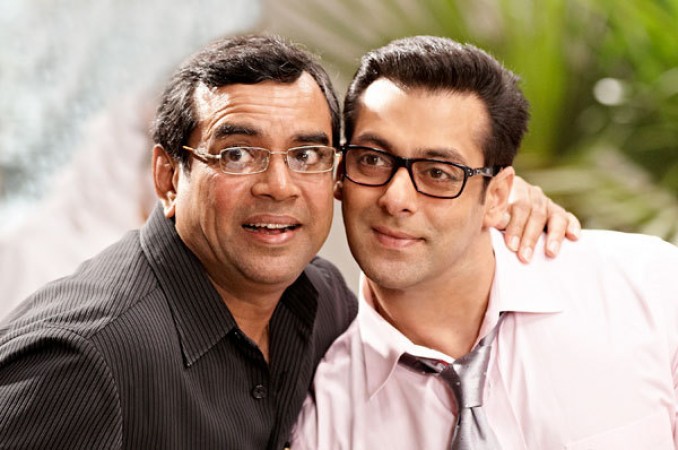
For centuries, tongue twisters have played a crucial role in language play. When uttered too rapidly, these expressions test our articulation skills and frequently produce humorous outcomes. One specific tongue-twisting scene from the movie "Ready," acted out by the late great Paresh Rawal, has become legendary in the Indian film industry. The clever use of the polysemous Hindi word "Bheja," which can mean "brains," "common sense," or "to send," adds to the tongue twister's brilliance in addition to its linguistic intricacy. This article delves into the cinematic masterpiece, analysing its humour, subtle linguistic elements, and Paresh Rawal's mastery as an actor.
The tongue twister in question appears in the well-known comedy and lighthearted entertainment film "Ready," a 2011 Bollywood production. In the film, Paresh Rawal portrays Dharam, a cunning and witty man who schemes to marry his daughter off to a wealthy man. At a critical juncture, Dharam is making fun of a group of young men who have come to ask his daughter to marry them in the scene with the tongue twister.
"Aap logo ko uparwala ne bheja toh bheja, lekin Bheje mein Bheja hi nahi bheja!"
It roughly translates to, "God sent them down with brains, but He didn't add common sense to their brains." Although this exchange appears to be a straightforward jab at first, its genius is found in the way the word "Bheja," which is polysemous and has several meanings, is used.
Polysemy is a phenomenon in language where a single word can have several related meanings. Regarding the term "Bheja," its principal connotations are "intellect" and "common sense." It can also mean "to send," in addition. The amusement in this tongue twister stems from Dharam's playful manipulation of the various meanings of "Bheja," which results in an absurd paradox. Insinuating that these young men possess intelligence, he suggests that they were really'sent' by God. He quickly refutes this, though, saying that "Bheje mein Bheja hi nahi bheja," which means "He didn't add common sense in their brains." This deft use of the polysemous word gives the conversation more nuance and humour.
Let's dissect the linguistic complexities contained in this brief sentence in order to fully appreciate the genius of this tongue twister:
The logo of the company is bheja. "God has sent them," is how this section establishes the basic idea. "Bheja" is used here to mean "to send."
toh bheja: This is the point at which polysemy appears. 'Bheja' means 'brains,' suggesting that God sent them with intelligence.
Hi nahi bheja lekin Bheje mein Bheja: 'Bheja' has a different meaning in this section. The phrase "common sense" is used. Dharam quips in jest that when God sent them, He didn't include common sense.
The unexpected turn in the dialogue, where Dharam mocks their lack of common sense instead of praising their intelligence, is what gives it its humour. The audience is treated to a delightful linguistic puzzle when these opposing meanings are juxtaposed within the same sentence.
This tongue twister is expertly delivered by Paresh Rawal, who is well-known for his superb comedic timing and acting abilities. The humour is enhanced by his tone, body language, and expression. The way he portrayed Dharam's character in "Ready" showcases his versatility as an actor.
Rawal gives a faultless performance in this scene. It's simple to follow the fast wordplay because of his precise enunciation of each word. The amusement of the situation is increased by his facial expressions, especially the cunning smile that goes along with the last punchline. One of India's best actors, Paresh Rawal stands out for his ability to perform such intricate dialogue with mastery.
The tongue twister 'Bheja' from 'Ready' expresses a common sentiment in Indian culture while also showcasing linguistic playfulness. The idea that someone is smart but lacks common sense is something that many people can identify with, and Dharam's lighthearted mockery emphasises this shared human experience. It also serves as an example of how language can effectively communicate irony and comedy, which makes it a standout scene in the movie.
A great example of the use of language in film is Paresh Rawal's tongue twister in "Ready." The conversation is given depth and humour by the deft use of the polysemous Hindi word "Bheja," which elevates a straightforward statement to the level of a literary masterpiece. This tongue twister is a perfect example of both the cultural significance of humour in Indian cinema and the acting prowess of Paresh Rawal. It is a moment that is still remembered for the great Paresh Rawal's ageless wit and intricate language.
The Minister and the Actress: Smriti Irani's Journey in 'All Is Well' (2015)
How A.R. Murugadoss Crafted Another Hindi Blockbuster through Remake Alchemy